also, too, either, as well的区别
- 格式:pdf
- 大小:229.11 KB
- 文档页数:2
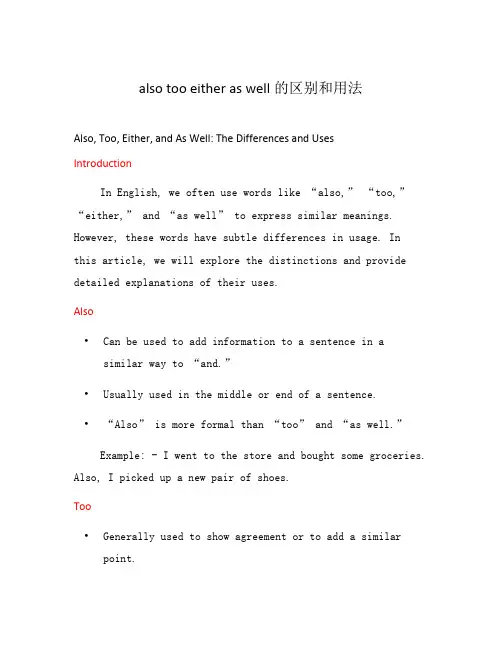
also too either as well的区别和用法Also, Too, Either, and As Well: The Differences and UsesIntroductionIn English, we often use words like “also,” “too,” “either,” and “as well” to express similar meanings. However, these words have subtle differences in usage. Inthis article, we will explore the distinctions and provide detailed explanations of their uses.Also•Can be used to add information to a sentence in a similar way to “and.”•Usually used in the middle or end of a sentence. •“Also” is more formal than “too” and “as well.”Example: - I went to the store and bought some groceries. Also, I picked up a new pair of shoes.Too•Generally used to show agreement or to add a similar point.•Used at the end of a sentence, following the subject. •Has a less formal tone compared to “also” and “as well.”Example: - She is going to the party tonight. I’m going too.Either•Used in a negative or alternative context.•Followed by “or” when presen ting a choice between two options.•Used when presenting options that are mutually exclusive.Example: - I don’t eat chocolate. I don’t like it either.As Well•Similar to “also” and “too” in meaning but is less commonly used.•Usually used at the end of a sentence.•Has a more formal tone than “too.”Example: - He plays the guitar. He sings as well.Summary•“Also” is formal, used to add information.•“Too” shows agreement or similarity.•“Either” presents negative or alternative op tions. •“As well” is a formal alternative to “also” and “too.”Remember, understanding the nuances of these words will help you convey your thoughts more accurately and effectively in English. Practice using them in various contexts to become more proficient in their usage.Additional Uses and ExamplesNow, let’s delve deeper into the uses of “also,” “too,” “either,” and “as well” by providing more examples and explanations.Also•“Also” can be used to add information to a sentence, similar to “and.”–Example: She loves to dance. She also enjoyspainting.•It is often used in the middle or end of a sentence.–Example: He studied hard for the exam. He also attended review classes.•“Also” is more formal than “too” and “as well.”–Example: She is not only talented but alsohardworking.Too•“Too” is used to show agreement or to add a similar point.–Example: Sarah is coming to the party. I’m coming too.•It is usually used at the end of a sentence, following the subject.–Example: I like ice cream too.•“Too” has a less formal tone compared to “also” and “as well.”–Example: He loves football too.Either•“Either” is used in a negative or alternative context.–Example: I don’t eat meat. I don’t eat fisheither.•It is followed b y “or” when presenting a choice between two options.–Example: You can either go to the movies or stay at home.•“Either” is used when presenting options that are mutually exclusive.–Example: You can either come with us or stay here alone.As Well•“As well” is similar in meaning to “also” and “too,”but it is less commonly used.–Example: They are talented singers. They are actors as well.•It is usually used at the end of a sentence.–Example: We will be attending the conference. We will be presenting our research as well.•“As well” has a more formal tone than “too.”–Example: He can swim. He can dive as well.ConclusionIn conclusion, while “also,” “too,” “either,” and “as well” have similar meanings, they have distinct uses and nuances. Understanding their differences will enable you to express yourself more precisely in English. Remember to practice using these words in various contexts to enhance your fluency and accuracy in conveying your ideas.。
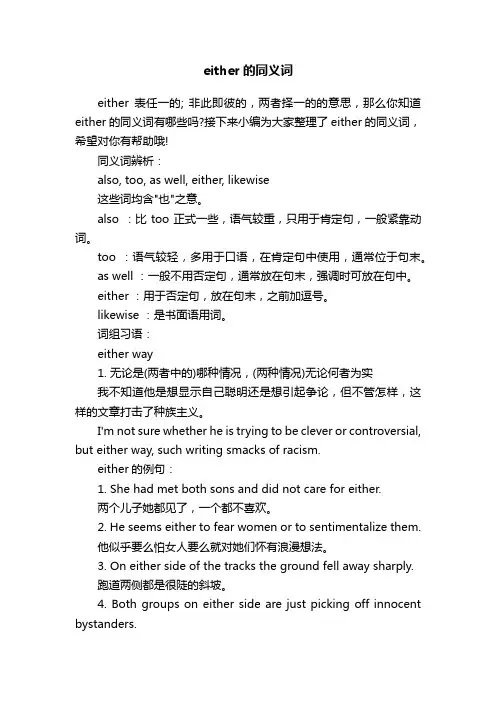
either的同义词either表任一的; 非此即彼的,两者择一的的意思,那么你知道either的同义词有哪些吗?接下来小编为大家整理了either的同义词,希望对你有帮助哦!同义词辨析:also, too, as well, either, likewise这些词均含"也"之意。
also :比too正式一些,语气较重,只用于肯定句,一般紧靠动词。
too :语气较轻,多用于口语,在肯定句中使用,通常位于句末。
as well :一般不用否定句,通常放在句末,强调时可放在句中。
either :用于否定句,放在句末,之前加逗号。
likewise :是书面语用词。
词组习语:either way1. 无论是(两者中的)哪种情况,(两种情况)无论何者为实我不知道他是想显示自己聪明还是想引起争论,但不管怎样,这样的文章打击了种族主义。
I'm not sure whether he is trying to be clever or controversial, but either way, such writing smacks of racism.either的例句:1. She had met both sons and did not care for either.两个儿子她都见了,一个都不喜欢。
2. He seems either to fear women or to sentimentalize them.他似乎要么怕女人要么就对她们怀有浪漫想法。
3. On either side of the tracks the ground fell away sharply.跑道两侧都是很陡的斜坡。
4. Both groups on either side are just picking off innocent bystanders.对峙双方都只是在瞄准射击无辜的旁观者。
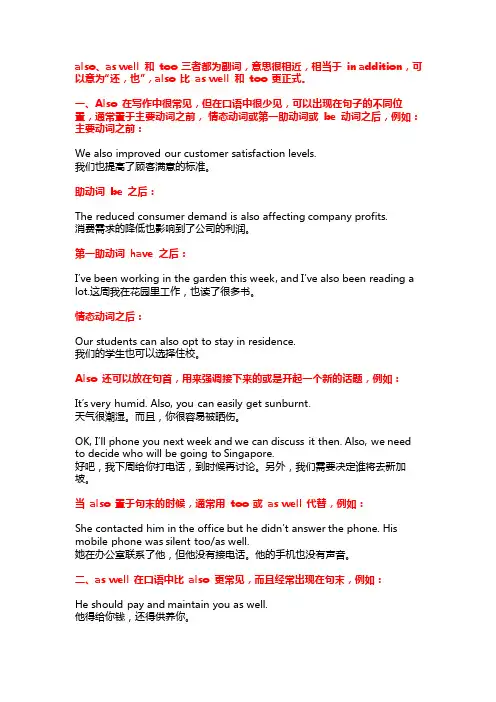
also、as well 和too 三者都为副词,意思很相近,相当于in addition,可以意为“还,也”,also 比as well 和too 更正式。
一、Also 在写作中很常见,但在口语中很少见,可以出现在句子的不同位置,通常置于主要动词之前,情态动词或第一助动词或be 动词之后,例如:主要动词之前:We also improved our customer satisfaction levels.我们也提高了顾客满意的标准。
助动词be 之后:The reduced consumer demand is also affecting company profits.消费需求的降低也影响到了公司的利润。
第一助动词have 之后:I’ve been working in the garden this week, and I’ve also been reading a lot.这周我在花园里工作,也读了很多书。
情态动词之后:Our students can also opt to stay in residence.我们的学生也可以选择住校。
Also 还可以放在句首,用来强调接下来的或是开起一个新的话题,例如:It’s very humid. Also, you can easily get sunburnt.天气很潮湿。
而且,你很容易被晒伤。
OK, I’ll phone you next week and we can discuss it then. Also, we need to decide who will be going to Singapore.好吧,我下周给你打电话,到时候再讨论。
另外,我们需要决定谁将去新加坡。
当also 置于句末的时候,通常用too 或as well 代替,例如:She contacted him in the office but he didn’t answer the phone. His mobile phone was silent too/as well.她在办公室联系了他,但他没有接电话。
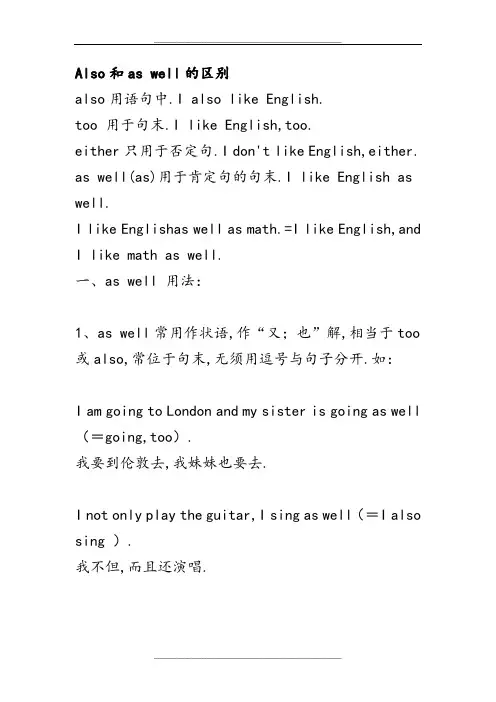
Also和as well的区别also用语句中.I also like English.too 用于句末.I like English,too.either只用于否定句.I don't like English,either. as well(as)用于肯定句的句末.I like English as well.I like Englishas well as math.=I like English,andI like math as well.一、as well 用法:1、as well常用作状语,作“又;也”解,相当于too 或also,常位于句末,无须用逗号与句子分开.如:I am going to London and my sister is going as well (=going,too).我要到伦敦去,我妹妹也要去.I not only play the guitar,I sing as well(=I also sing ).我不但,而且还演唱.2、as well 在口语中也可用于句中,作“也好,也行”或“倒不如”解,用来缓和语气.如:You may as well go、你去也好.The weather was so bad that we might(just)as well have stayed at home.天气太坏了,早知道如此,倒不如呆在家里为好.3、as well 可以直接用于just后,用作应答语(可视为It's just as well、的省略),作“幸亏,幸而;无妨;没关系”解.如:—We were too late to see the film.我们去得太晚了,没有看上电影.—Just as well、I hear it isn't very good.不必遗憾,我听说电影也不怎么样.二、as well as 用法1、as well as常用来连接两个并列的成分,作“也,还”解.它强调的是前一项,后一项只是顺便提及.因此连接并列主语时,与前一项一致;而用notonly ...but also...连接时,与后一项一致.如:Your wife as well as you is friendly to me.不仅你而且你的妻子也对我很友好.(=Not only you but also your wife is friendly to me、)Electric energy can be changed into light energy as well as into sound energy.电能既可以被转变成声能,又可以被转变成光能. 2、as well as 用来表示同级比较,指“一样好”.如:You look as well as you did ten years ago.你的身体看起来还和十年前一样好.He plays the guitar as well as you.他的吉他弹得和你一样好.。
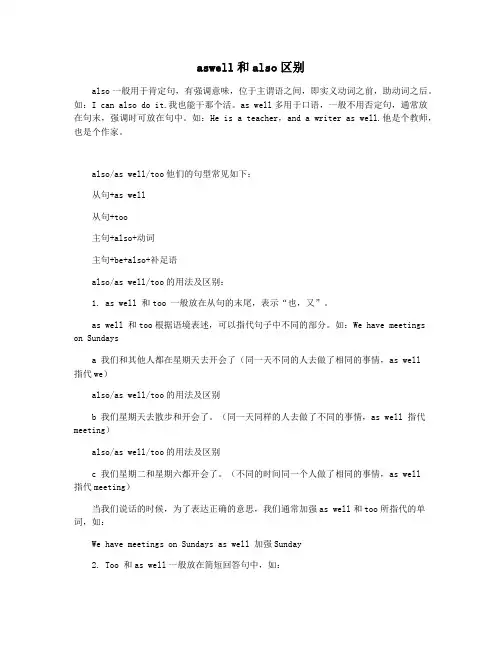
aswell和also区别also一般用于肯定句,有强调意味,位于主谓语之间,即实义动词之前,助动词之后。
如:I can also do it.我也能干那个活。
as well多用于口语,一般不用否定句,通常放在句末,强调时可放在句中。
如:He is a teacher,and a writer as well.他是个教师,也是个作家。
also/as well/too他们的句型常见如下:从句+as well从句+too主句+also+动词主句+be+also+补足语also/as well/too的用法及区别:1. as well 和too 一般放在从句的末尾,表示“也,又”。
as well 和too根据语境表述,可以指代句子中不同的部分。
如:We have meetings on Sundaysa 我们和其他人都在星期天去开会了(同一天不同的人去做了相同的事情,as well指代we)also/as well/too的用法及区别b 我们星期天去散步和开会了。
(同一天同样的人去做了不同的事情,as well 指代meeting)also/as well/too的用法及区别c 我们星期二和星期六都开会了。
(不同的时间同一个人做了相同的事情,as well指代meeting)当我们说话的时候,为了表达正确的意思,我们通常加强as well和too所指代的单词,如:We have meetings on Sundays as well 加强Sunday2. Too 和as well一般放在简短回答句中,如:A.“She's nice"B."I think so too." A.她很好。
B.我也这样认为在不正式的场合,我们经常使用Me too 来做简短回答,如:在正式场合,我们就会用” I am too"/ So am I3.also 一般放在动词前面,如句子中有助动词am,is ,are,was were,also一般放在它们后面, Also能指向句子中的任何部分,跟as well 和too的用法一样,但是also 不能用在简短回答中。
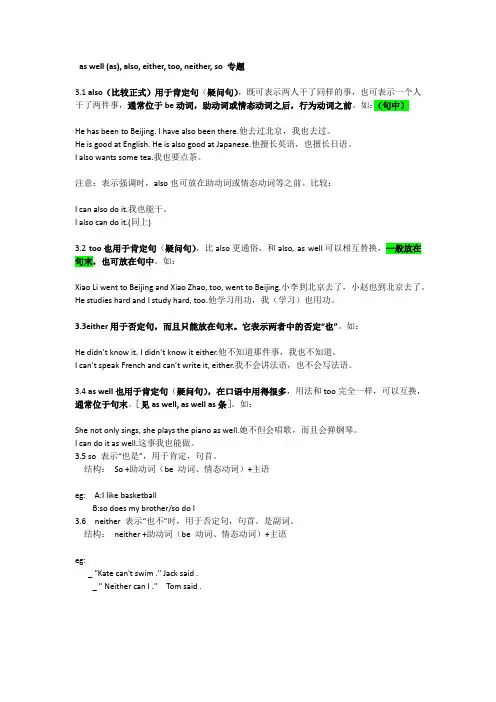
as well (as), also, either, too, neither, so 专题3.1 also(比较正式)用于肯定句(疑问句),既可表示两人干了同样的事,也可表示一个人干了两件事,通常位于be动词,助动词或情态动词之后,行为动词之前。
如:(句中)He has been to Beijing. I have also been there.他去过北京,我也去过。
He is good at English. He is also good at Japanese.他擅长英语,也擅长日语。
I also wants some tea.我也要点茶。
注意:表示强调时,also也可放在助动词或情态动词等之前。
比较:I can also do it.我也能干。
I also can do it.(同上)3.2 too也用于肯定句(疑问句),比also更通俗,和also, as well可以相互替换,一般放在句末,也可放在句中。
如:Xiao Li went to Beijing and Xiao Zhao, too, went to Beijing.小李到北京去了,小赵也到北京去了。
He studies hard and I study hard, too.他学习用功,我(学习)也用功。
3.3either用于否定句,而且只能放在句末。
它表示两者中的否定“也”。
如:He didn’t know it. I didn’t know it either.他不知道那件事,我也不知道。
I can’t speak French and can’t write it, either.我不会讲法语,也不会写法语。
3.4 as well也用于肯定句(疑问句),在口语中用得很多,用法和too完全一样,可以互换,通常位于句末。
[见as well, as well as条]。
如:She not only sings, she plays the piano as well.她不但会唱歌,而且会弹钢琴。
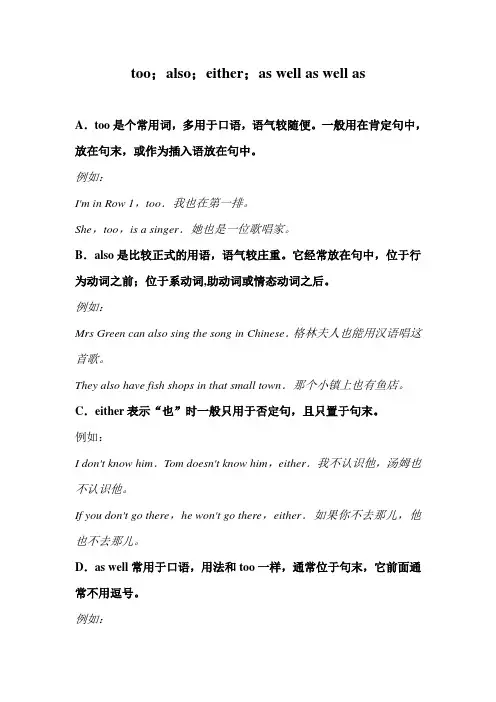
too;also;either;as well as well asA.too 是个常用词,多用于口语,语气较随便。
一般用在肯定句中,放在句末,或作为插入语放在句中。
例如:I'm in Row 1,too.我也在第一排。
She,too,is a singer.她也是一位歌唱家。
B.also 是比较正式的用语,语气较庄重。
它经常放在句中,位于行为动词之前;位于系动词,助动词或情态动词之后。
例如:Mrs Green can also sing the song in Chinese.格林夫人也能用汉语唱这首歌。
They also have fish shops in that small town.那个小镇上也有鱼店。
C.either 表示“也”时一般只用于否定句,且只置于句末。
例如:I don't know him.Tom doesn't know him,either.我不认识他,汤姆也不认识他。
If you don't go there,he won't go there,either.如果你不去那儿,他也不去那儿。
D.as well 常用于口语,用法和 too一样,通常位于句末,它前面通常不用逗号。
例如:She is a teacher and a singer as well.她是教师,也是歌唱家。
I know Japanese as well.我也懂日语。
【巩固练习】1.用too,also,either或as well填空:1)I'll go to see the film,.2)If you don't come here,I shouldn't,.3)I,,will help him.4)Jack can speak Chinese,and his brother can speak Chinese.5)He knows Chineseas well与as well as一. as well 用法:1. as well常用作状语, 作“又;也”解, 相当于too或also, 常位于句末, 无须用逗号与句子分开。
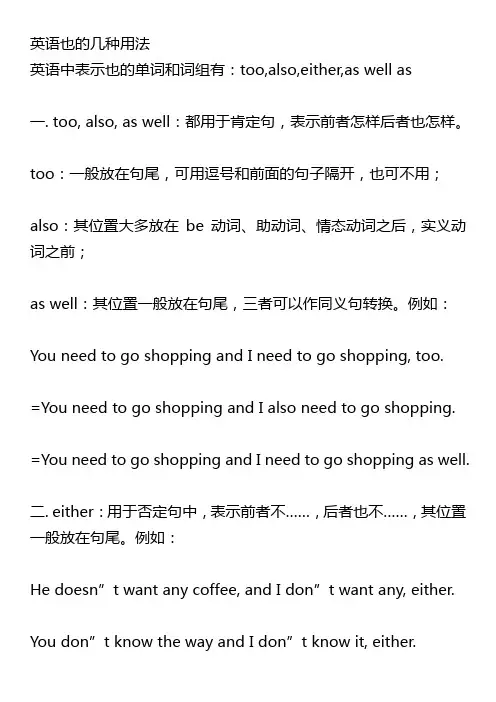
英语也的几种用法
英语中表示也的单词和词组有:too,also,either,as well as
一. too, also, as well:都用于肯定句,表示前者怎样后者也怎样。
too:一般放在句尾,可用逗号和前面的句子隔开,也可不用;
also:其位置大多放在be动词、助动词、情态动词之后,实义动词之前;
as well:其位置一般放在句尾,三者可以作同义句转换。
例如:You need to go shopping and I need to go shopping, too.
=You need to go shopping and I also need to go shopping. =You need to go shopping and I need to go shopping as well.
二. either:用于否定句中,表示前者不……,后者也不……,其位置一般放在句尾。
例如:
He doesn”t want any coffee, and I don”t want any, either. You don”t know the way and I don”t know it, either.
希望帮到你。
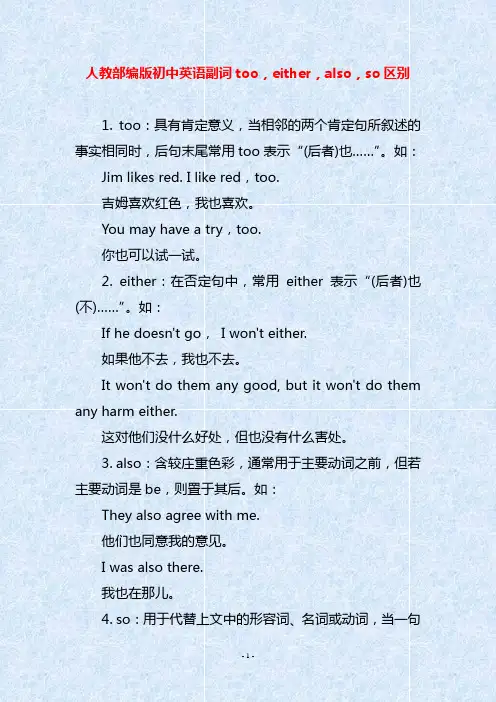
人教部编版初中英语副词too,either,also,so区别1. too:具有肯定意义,当相邻的两个肯定句所叙述的事实相同时,后句末尾常用too表示“(后者)也……”。
如:Jim likes red. I like red,too.吉姆喜欢红色,我也喜欢。
You may have a try,too.你也可以试一试。
2. either:在否定句中,常用either表示“(后者)也(不)……”。
如:If he doesn't go,I won't either.如果他不去,我也不去。
It won't do them any good, but it won't do them any harm either.这对他们没什么好处,但也没有什么害处。
3. also:含较庄重色彩,通常用于主要动词之前,但若主要动词是be,则置于其后。
如:They also agree with me.他们也同意我的意见。
I was also there.我也在那儿。
4. so:用于代替上文中的形容词、名词或动词,当一句话说完之后,接着一句用倒装结构,表示“(后者)也……”。
如:Mary is very happy and so is everyone else in her birthday party.在玛莉的生日宴会上,她非常高兴,其他人也非常愉快。
5. as well:常用于句末,意为“也;还”。
如:He speaks English, and he knows French as well.他说英语,也懂法语。
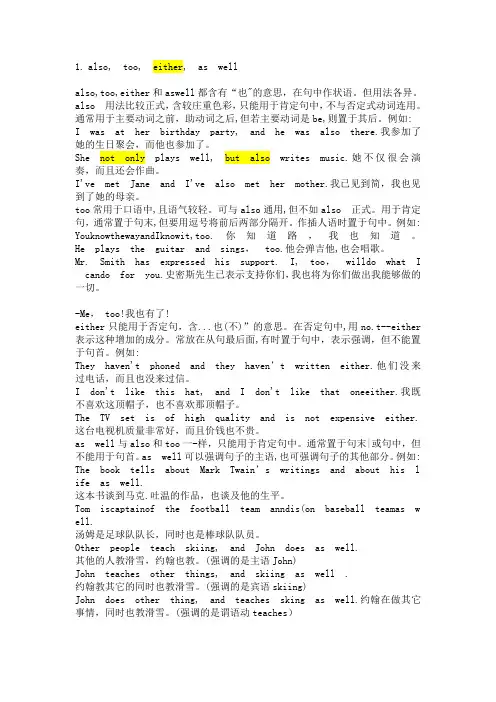
1.also, too, either, as wellalso,too,either和aswell都含有“也"的意思,在句中作状语。
但用法各异。
also 用法比较正式,含较庄重色彩,只能用于肯定句中,不与否定式动词连用。
通常用于主要动词之前,助动词之后,但若主要动词是be,则置于其后。
例如: I was at her birthday party, and he was also there.我参加了她的生日聚会,而他也参加了。
She not only plays well, but also writes music.她不仅很会演奏,而且还会作曲。
I've met Jane and I've also met her mother.我已见到简,我也见到了她的母亲。
too常用于口语中,且语气较轻。
可与also通用,但不如also 正式。
用于肯定句,通常置于句末,但要用逗号将前后两部分隔开。
作插人语时置于句中。
例如: YouknowthewayandIknowit,too.你知道路,我也知道。
He plays the guitar and sings,too.他会弹吉他,也会唱歌。
Mr. Smith has expressed his support. I, too,willdo what I cando for you.史密斯先生已表示支持你们,我也将为你们做出我能够做的一切。
-Me, too!我也有了!either只能用于否定句,含...也(不)”的意思。
在否定句中,用no.t--either 表示这种增加的成分。
常放在从句最后面,有时置于句中,表示强调,但不能置于句首。
例如:They haven't phoned and they haven’t written either.他们没来过电话,而且也没来过信。
I don't like this hat, and I don't like that oneeither.我既不喜欢这顶帽子,也不喜欢那顶帽子。
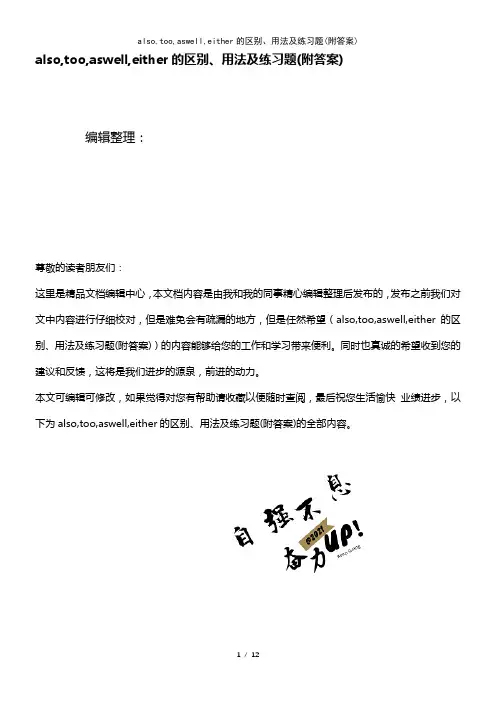
also,too,aswell,either的区别、用法及练习题(附答案)编辑整理:尊敬的读者朋友们:这里是精品文档编辑中心,本文档内容是由我和我的同事精心编辑整理后发布的,发布之前我们对文中内容进行仔细校对,但是难免会有疏漏的地方,但是任然希望(also,too,aswell,either的区别、用法及练习题(附答案))的内容能够给您的工作和学习带来便利。
同时也真诚的希望收到您的建议和反馈,这将是我们进步的源泉,前进的动力。
本文可编辑可修改,如果觉得对您有帮助请收藏以便随时查阅,最后祝您生活愉快业绩进步,以下为also,too,aswell,either的区别、用法及练习题(附答案)的全部内容。
also, too, as well, either的区别、用法及练习题also, too,as well, either中文都有“也”的意思。
also, too,as well都只用在肯定句之中,只是在句中所用的位置不同.而either只用在1.also,用于肯定句中,表示“也”的意思。
如:Jane speaks French。
Sam also speaks French。
He loves chocolate. I also love pizza。
Frank can come with us。
Nancy can also come with us.also在句子中的位置,主要有四种情况:(1)放在be动词之后。
如:I am also Canadian.I was also there。
(2) 放在实义(行为)动词之前.如:I also sing。
He also helped us。
(3) 放在助动词、情态动词之后。
如:I have also been to Hong Kong.I am also studying economics.I can also speak French.I should also be there。
Also和as well的区别also用语句中.I also like English.too 用于句末.I like English,too.either只用于否定句.I don't like English,either.as well(as)用于肯定句的句末.I like English as well.I like Englishas well as math.=I like English,and I like math as well.一、as well 用法:1、as well常用作状语,作“又;也”解,相当于too或also,常位于句末,无须用逗号与句子分开.如:I am going to London and my sister is going as well(=going,too). 我要到伦敦去,我妹妹也要去.I not only play the guitar,I sing as well(=I also sing ).我不但弹吉他,而且还演唱.2、as well 在口语中也可用于句中,作“也好,也行”或“倒不如”解,用来缓和语气.如:You may as well go、你去也好.The weather was so bad that we might(just)as well have stayed at home.天气太坏了,早知道如此,倒不如呆在家里为好.3、as well 可以直接用于just后,用作应答语(可视为It's just as well、的省略),作“幸亏,幸而;无妨;没关系”解.如:—We were too late to see the film.我们去得太晚了,没有看上电影.—Just as well、I hear it isn't very good.不必遗憾,我听说电影也不怎么样.二、as well as 用法1、as well as常用来连接两个并列的成分,作“也,还”解.它强调的是前一项,后一项只是顺便提及.因此连接并列主语时,谓语动词与前一项一致;而用not only ...but also...连接时,谓语动词与后一项一致.如:Your wife as well as you is friendly to me.不仅你而且你的妻子也对我很友好.(=Not only you but also your wife is friendly to me、)Electric energy can be changed into light energy as well as into sound energy.电能既可以被转变成声能,又可以被转变成光能.2、as well as 用来表示同级比较,指“一样好”.如:You look as well as you did ten years ago.你的身体看起来还和十年前一样好.He plays the guitar as well as you.他的吉他弹得和你一样好.。
also,too,aswell,either的区别、用法及练习题(附答案)编辑整理:尊敬的读者朋友们:这里是精品文档编辑中心,本文档内容是由我和我的同事精心编辑整理后发布的,发布之前我们对文中内容进行仔细校对,但是难免会有疏漏的地方,但是任然希望(also,too,aswell,either的区别、用法及练习题(附答案))的内容能够给您的工作和学习带来便利。
同时也真诚的希望收到您的建议和反馈,这将是我们进步的源泉,前进的动力。
本文可编辑可修改,如果觉得对您有帮助请收藏以便随时查阅,最后祝您生活愉快业绩进步,以下为also,too,aswell,either的区别、用法及练习题(附答案)的全部内容。
also, too, as well, either的区别、用法及练习题also, too,as well, either中文都有“也”的意思。
also, too,as well都只用在肯定句之中,只是在句中所用的位置不同.而either只用在1.also,用于肯定句中,表示“也”的意思。
如:Jane speaks French。
Sam also speaks French。
He loves chocolate. I also love pizza。
Frank can come with us。
Nancy can also come with us.also在句子中的位置,主要有四种情况:(1)放在be动词之后。
如:I am also Canadian.I was also there。
(2) 放在实义(行为)动词之前.如:I also sing。
He also helped us。
(3) 放在助动词、情态动词之后。
如:I have also been to Hong Kong.I am also studying economics.I can also speak French.I should also be there。
too;also;either;as well的区别too;either;neither;as well as;有什么区别also, too 和 eitheralso表示"也"是比较正式的用词, too 是普通用词,口语中用的多,使用时应注意:also 一般用于句子中,其位置在行为动词之前,动词to be之后。
如有助动词或情态动词,一般应在助动词或情态动词后,为了强调,也可放在前面。
例如:*I also went.我也去了。
*You are also wrong.你也错了。
too常置于句末,前面可用逗号,如置于句中,其前后均有逗号。
例如*He is a singer ,too.他也是歌唱家。
*He,too,is a singer.注意: also,too只能用于肯定句。
either 表示“也”,只能用在否定句中,必须放在句末。
例如:*He didn''t go there. I didn''t either.你不去那里,我也不去那里。
neither表示"两者都不"。
Eg. In neither case can I agree.两种情形我都不能同意。
Eg. Neither of them wants to stop for a rest.他们俩人谁也不愿意停下来休息。
as well as 作并列连词相当于not only…but also和no less…than,但not only…but also侧重在后项,as well as 和no less…than侧重在前项。
例如:We must learn to look at problems all-sidedly, seeing the reverse as well as the obverse side or things.A true man should be practical as well as far-sighted.在否定句中,as well as 的位置不同,句意往往有很大差别。
also的同义词辨析同义词是几个声音不同而意义相同或基本相同的词。
下面是小编为你带来的also的同义词辨析,欢迎阅读。
also的同义词辨析also, too, as well, either, likewise这些词均含“也”之意also :比too正式一些,语气较重,只用于肯定句,一般紧靠动词。
too :语气较轻,多用于口语,在肯定句中使用,通常位于句末。
as well :一般不用否定句,通常放在句末,强调时可放在句中。
either :用于否定句,放在句末,之前加逗号。
likewise :是书面语用词。
also [':lsu]adv. 也;而且;同样conj. 并且;另外例句:1. You know tornado? Also a big wind.你知道龙卷风?也是一种大风。
2. Our cute baby also liked it there.我们可爱的宝贝也喜欢那里。
too [tu:]adv. 太;也;很;还;非常;过度例句:1. He is young, clever and rich too.他年轻、聪明,还富有。
2. And you work out at home, too!而且你在家里也做健身运动!either ['ai, 'i:-]adj. 两者之中任一的;两者之中每一的prep. 任何一个conj. 或者adv. 也(用于否定句或否定词组后);[口]根本例句:1. The fruit of either of these plants.广泛分布的植物和果类害虫。
2. You can learn either singing or dancing.你可以学唱歌也可以学跳舞。
also, too, as well, either的区别、用法及练习题1.also, 用于肯定句中,表示“也”的意思。
如:Jane speaks French. Sam also speaks French.He loves chocolate. I also love pizza.Frank can come with us. Nancy can also come with us.also在句子中的位置,主要有四种情况:(1) 放在be动词之后。
如:I am also Canadian.I was also there.(2) 放在实义(行为)动词之前。
如:I also sing.He also helped us.(3) 放在助动词、情态动词之后。
如:I have also been to Hong Kong.I am also studying economics.I can also speak French.I should also be there.(4) 放在句首,用逗号隔开,表示强调。
如:It’s very humid. Also, you can easily get sunburnt.It is a small house. Also, it needs a lot of repairs.2.too, 用于肯定句中,表示“也”的意思。
如:Jane speaks French. Sam speaks French too.I love chocolate. I love pizza too.Frank can come with us. Nancy can come with us too.too, 在句子中的位置,主要有两种情况。
如:(1)放在句子末尾,可以用逗号隔开,也可以不用逗号隔开。
如:David is a teacher. His wife is a teacher, too. (用逗号隔开)David is a teacher. His wife is a teacher too. (不用逗号隔开)I can speak French too.I am studying economics too.If he wants to go too, he should meet us at 8:00.(2)插入句子中。
初中英语:副词too,either,also,so的区别1. too:具有肯定意义,当相邻的两个肯定句所叙述的事实相同时,后句末尾常用too表示“(后者)也……”。
如:Jim likes red. I like red,too.吉姆喜欢红色,我也喜欢。
You may have a try,too.你也可以试一试。
2. either:在否定句中,常用either表示“(后者)也(不)……”。
如:If he doesn't go, I won't either.如果他不去,我也不去。
It won't do them any good, but it won't do them any harm either.这对他们没什么好处,但也没有什么害处。
3. also:含较庄重色彩,通常用于主要动词之前,但若主要动词是be,则置于其后。
如:They also agree with me.他们也同意我的意见。
I was also there.我也在那儿。
4. so:用于代替上文中的形容词、名词或动词,当一句话说完之后,接着一句用倒装结构,表示“(后者)也……”。
如:Mary is very happy and so is everyone else in her birthday party.在玛莉的生日宴会上,她非常高兴,其他人也非常愉快。
5. as well:常用于句末,意为“也;还”。
如:He speaks English, and he knows French as well.他说英语,也懂法语。
also, too, either, as well的区别
这四个副词均可表示“也”,区别如下:
1.too 和as well 多用于口语中,语气较轻,通常用于肯定句或疑问句,一般不用于否定句,且通常放在句末。
如:
I like you too [as well]. 我也喜欢你。
Are they coming too [as well]? 他们也来吗?
too 有时也紧跟在主语后(注:a s well 不这样用),此用法较正式。
如:
I, too, know where he lives. 我也知道他住在什么地方。
在Me too, You too 这类简略答语中,通常不用as well, also。
如:
A:I’m tired. 我累了。
B:M e too. 我也是。
2.also 比too 和as well 正式,一般也不用于否定句,它在句中的位置通常是紧靠动词,即放在行为动词之前,特殊动词之后。
有时为了强调也放在句末(但不常见)。
如:
He also came. / He came also. 他也来了。
She is young and beautiful,a nd also rich. 她年轻漂亮,而且有钱。
also 有时用于句首(其后通常有逗号),相当于连词and。
如:
Also,h is mother was dead. 再说,他母亲又过世了。
3.either(也)通常只用于否定句,且要放在句末。
如:
I don’t know, either. 我也不知道。
He hasn’t finished it,e ither.他也还没有做完。
注:有时在肯定句之后跟一个否定句,可能用too,a lso。
如:
He came, but she didn’t also came. 他来了,但她没有也一起来。
He went to Washington, but not to New York too. 他去了华盛顿,但并不是也去了纽约。
比较:
He didn’t buy a computer, and she didn’t e ither.他没有买电脑,她也没有买。
He bought a computer, but she d idn’t too.他买了台电脑,但她没有也买台电脑。
英语微信群是目前学习英语最有效的方法,群里都是说英语,没有半个中文,而且规则非常严格,是一个超级不错的英语学习环境,群里有好多英语超好的超牛逼的人,还有鬼佬和外国美眉。
其实坦白说,如果自己一个人学习英语太孤独,太寂寞,没有办法坚持,好几次都会半途而废。
只要你加入到那个群里以后,自己就会每天都能在群里坚持学,坚持不停地说和练,由于是付费群,群里的成员学习氛围非常强,每天的训练度都非常猛,本来很懒惰的你一下子就被感染了,不由自主地被带动起来参与操练,不好意思偷懒,别人的刻苦学习精神会不知不觉影响你,EYC英语微信群(群主vx 601332975)可以彻底治好你的拖延症,里面学员都非常友好,总是给你不断的帮助和鼓励,让你学英语的路上重新燃起了斗志,因为每天都在运用,你的英语口语就能得到了迅猛的提升,现在可以随便给一个话题,都能用英文滔滔不绝的发表5分钟以上对这个话题的看法和观点,想提高英语口语的可以加入进来,It really works very well.。